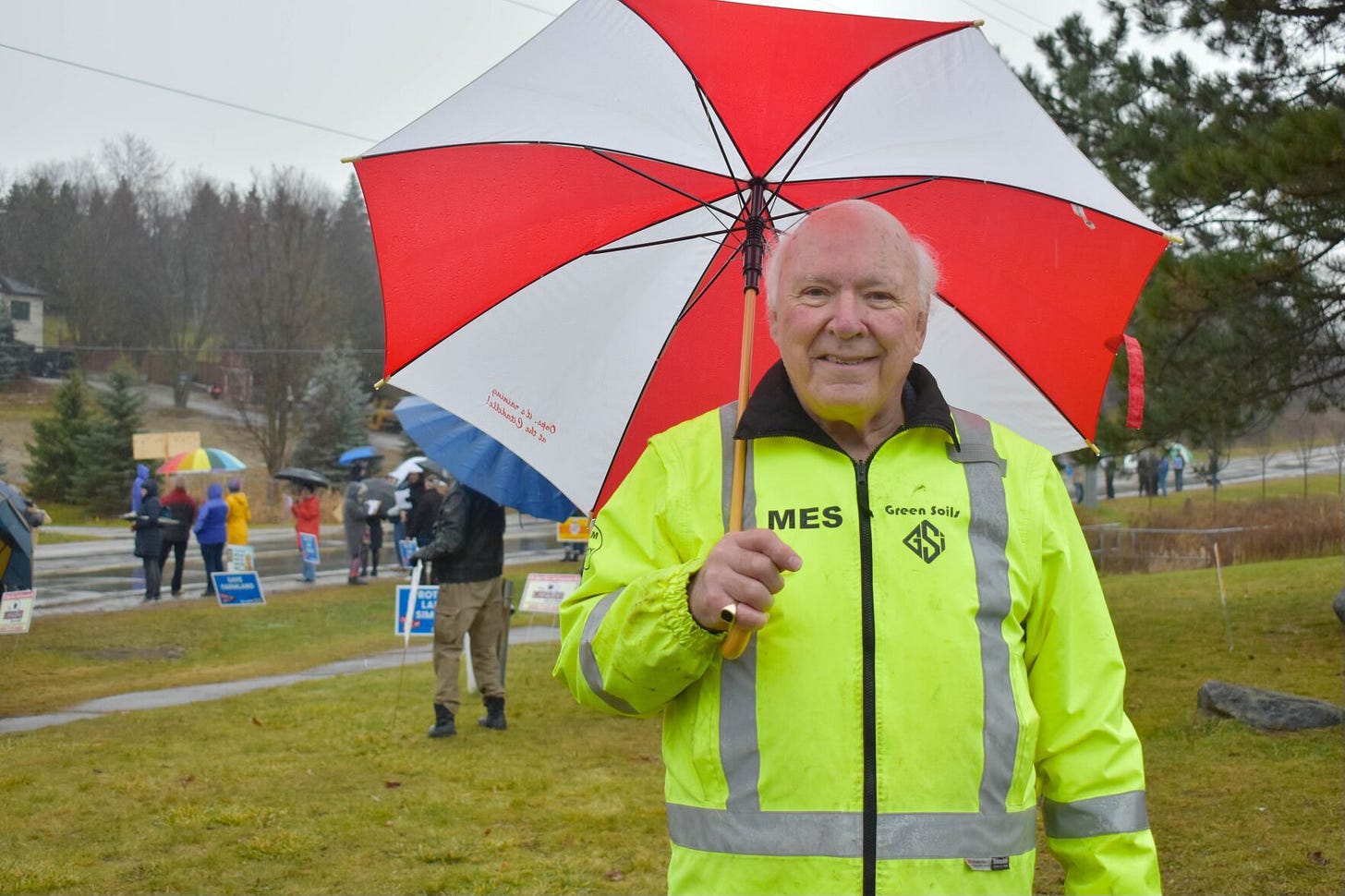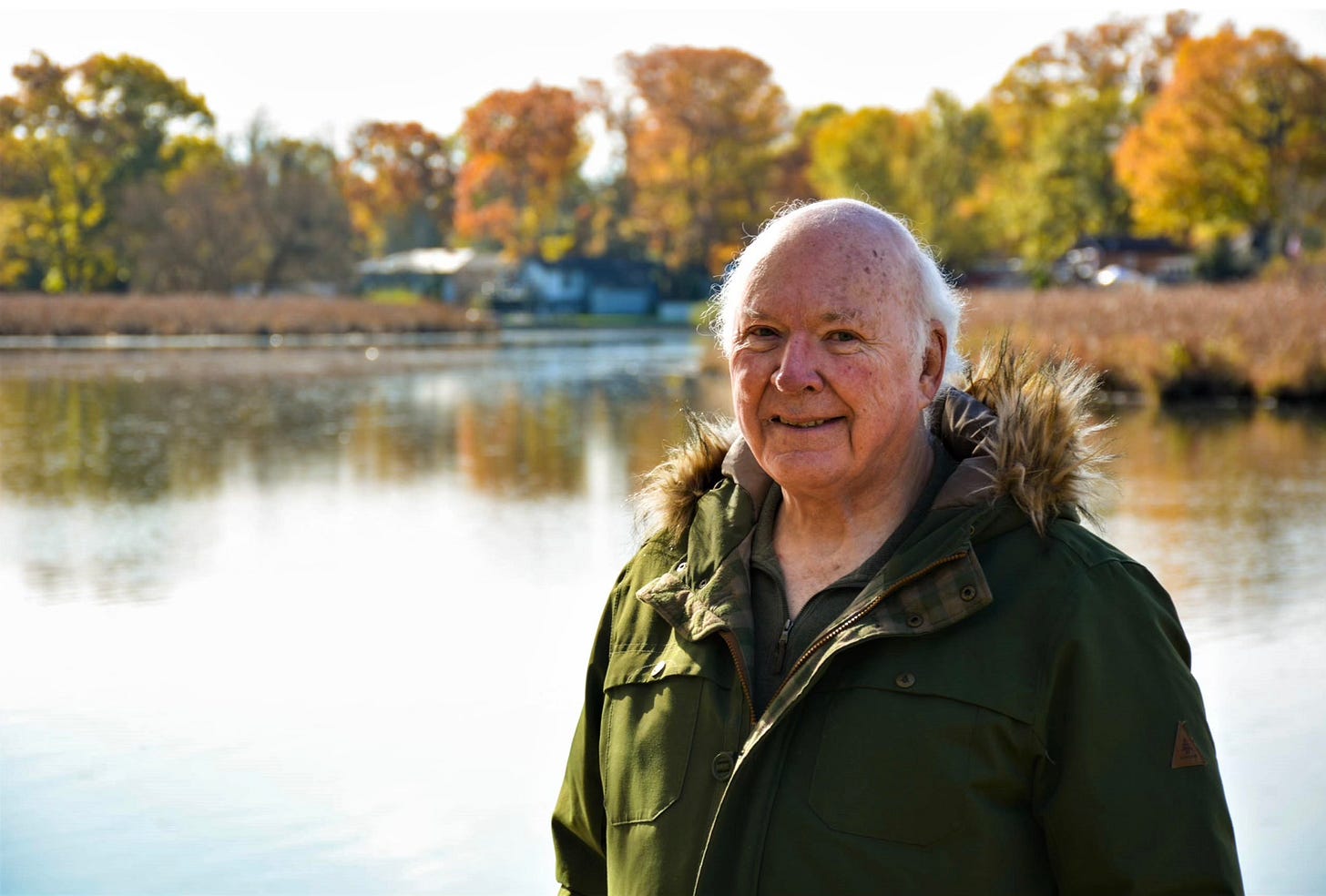Legacy
In Memoriam: Bill Foster
As people age and get closer to their golden years (I am quickly falling into this group), many start thinking about their legacy. How will they be remembered? How will their impact be measured? Will they be remembered? Did they do enough?
I think these are natural questions that occur when you start to wrestle with your own mortality regardless of what you believe happens to you on the other side. They also tend to pop up when someone close to you dies. The questions seemingly become more urgent as death touches your own circle.
This past week, I lost a friend and colleague, Bill Foster. His passing has given me the chance to contemplate how I knew him and what I could learn from him. I’d like to share these thoughts with you not only as a way to honour this man, but to also share the contemplations that have brought me some peace.
First, I met Bill sometime in early 2021. Claire Malcolmson, who at the time was running the Rescue Lake Simcoe Coalition, and I held a zoom meeting to talk about the Bradford Bypass. Bill was one of the first joiners and was a stalwart throughout the campaign.
What we came to learn was that Bill had fought the highway the first time in the late 1990s and figured it a done issue when Premier Dalton McGuinty agreed that the project was too costly and outlined that local infrastructure investments and transit would better serve the locals and the public purse. McGuinty cancelled it and there it lay dormant for decades until the current government resurrected this zombie highway.
Bill headed FROGS - Forbid Roads Over Green Spaces - and was especially concerned about what a then 4, now 8, lane highway would do to the Holland Marsh wetland seeing it is the largest intact wetland left that purifies water into Lake Simcoe. Like a knife, this elevated highway would slice through sensitive wetlands, forests and farm fields changing the ecology and environment forever. I saw Bill’s care for something greater than himself. I saw his concern that the decisions we were making today seemed to come at a great expense for future generations.
He helped organize walks and talked to neighbours at length. Bill knew the power of community.
He was also a stickler for facts and proper process. He could rattle off Ministry of Transportation policy better than most of the bureaucrats and certainly more than the politicians who supported this idea. He wanted due diligence. He didn’t want to see property of his neighbours expropriated without due process or ability to appeal, but that’s what then newly created legislation allowed. It angered Bill. His care for justice burned bright.
I saw Bill moved to tears when Indigenous knowledge keepers and elders shared with him about the place where this future 8 lane highway would cross the Holland River. They shared with Bill their stories and how they could feel the ancestors in this place of rest, trade and history. He was in awe of the reverence that they treated the crossing, the river and the forests surrounding it and how it contrasted with the cavalier attitude all levels of government were taking at its destruction. I saw Bill’s heart and his love for what many take for granted.
He could rattle on at length about this crossing, the Lower Landing, as a key place of Indigenous and settler history. In fact, so historically important that archeologists have said this place is more important than 95% of already federally designated site of historical value. And yet, there it sits centuries of history left vulnerable waiting to be dug up and destroyed without any willingness to see if there were better answers. Bill admired our shared history. He loved the layers of stories upon which we stand. I saw Bill’s desire to protect the legacies of our ancestors and more importantly to be a good ancestor himself.
When we organized our first rally in front of MPP Caroline Mulroney’s office there was Bill - arrived early with a smile on his face and willingness to do whatever was needed. When the police came at the request of the building landlord there were 6 senior citizens, one of whom just had knee surgery and using a walker, Bill and myself. He knew we were not blocking lanes, we were not causing a ruckus and believed in our rights to assemble. So, as the gentle giant we knew him to be, he respectfully talked to the police, we moved our small gathering to the roadside and Bill stood pin straight with a smile on his face - he wasn’t going to be intimidated for doing the right thing. I saw Bill’s sense of duty and his protective nature, but also his respect for law and order.
He was aghast at the stupidity of the entire plan - outdated studies from the 1990s, shortcuts into environmental and public health studies aided by new legislation, a ballooning budget that is well into the billions of dollars for a 16 km stretch of highway, no due process, no understanding of how it would impact Lake Simcoe, no thought about how they’re going to protect public wells or manage the known health impacts (cancer, lung issues, heart disease) for locals who will now be living and playing in its shadow. For Bill it wasn’t being against something - it was being for something better. A better plan, a better investment, a better way forward. The fact that the province wouldn’t even consider another route, investments in local road infrastructure was baffling because Bill cared about what governments did on our behalf. Bill believed in government being a force for good an entity that elevates us as a community. I saw Bill’s belief in the possible and in hope that things could be different.
I spoke to Bill about 2 months ago. We both knew that that the highway isn’t even close to construction yet, that the plans for design are still outstanding and that the completion date is still over a decade away. We also knew that his health was in decline and he would be understandably stepping back. But he still had a twinkle in his eye and he said, “Once I beat this I’m coming back because it’s the right thing to do.”
In the end, that was Bill’s legacy. He led by example. He showed up when it was tough; he cheered us on when things seemed impossible. I can’t speak to all sides of this person, but I know what I saw and more importantly how it felt to be around him. I saw a man of principle and someone who dedicated the last few years of his life to something greater than himself. He will likely never make it into a history book, nor have his name emblazoned on a wing of a hospital, but those that knew him will remember that legacy is more about how you make people feel and the example you lead.
And now you know Bill too. May his story remind us that the truest legacies aren’t written in stone or policy; they live in the people who keep showing up, telling the truth, and caring for the world they’ll never see finished.
Bill did that. He fought for fairness, for due process, for clean water and living history. He stood for all the things that make a community worth belonging to. And because of him, many of us will keep doing it too.
I hope his story stays with you—the way his care for this place stayed with me. Because legacy isn’t fame or recognition. It’s the echo of a good heart in motion. And Bill’s echo will be felt for a long time.





Thank you for writing this beautiful tribute Margaret. The world could use a lot more Bills!
This beautiful tribute to a truly amazing person is inspirational. There are few quick victories but like Bill did we need to continue fighting to protect what is so valuable and rare.